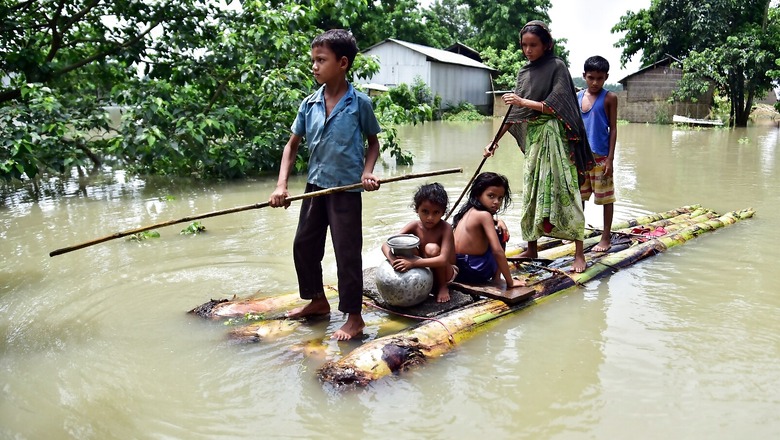
views
A new crisis has befallen the women in flood-hit Assam as many are reportedly refusing to have rice, the staple of the region, for fear of relieving themselves the morning after. The dearth of a clean and dry area to defecate have pushed several women in Assam’s Nagaon and Darang districts to reduce consumption of food and water by nearly one-third.
In the absence of water to wash themselves, many are resorting to defecation every once in 2-3 days while others are forced to use floodwater to keep themselves clean. Using the washrooms of the better-off homes in the districts is an option but many a time it’s inaccessible leading several young girls to hold back stool for long periods spanning over 2 to 4 days. This in turn makes them lose the urge to defecate resulting in constipation.
In addition to enduring constipation, uneasiness and back aches, this has also put many women on the brink of a moral dilemma. Twenty-five-year-old Meenu, a resident of Darang district in Assam, says she would rather use the available clean water to bathe her sons and for cooking rather for her personal use.
“We are facing a huge scarcity of clean water. The only hand pump available in our village is 1.5-2 kms away and is used by nearly 500 households consisting of 2,000 members. We have to go to great lengths to get this limited quantity of water, hence, we prefer to save the water for consumption rather than use it for washing ourselves,” says Meenu.
Food, Water, Now Hygiene?
Many women living along the belts of Darang and Nagaon districts have also been facing the double whammy of the menstrual cycle. The economic depravity coupled with a deluge has left the women distressed and in a constant state of anxiety.
“I cannot afford sanitary napkins, nor do I have enough water to wash the clothes used during those 5-6 days. I stay awake at night out of anxiety. This is the worst that I can go through at a time when my house is drowning,” Najma (30) tells News18.com.
‘Everybody is Put in the Open’
Talking to News18, Geeta Lama of ‘Save the Children in India’ says that floods in Assam are a common occurrence and each year it leaves behind the same devastation. However, what sets the floods of 2022 apart is its magnanimity.
“The pre-monsoon showers in the month of May have led to widespread damage of crops with approximately 82 thousand hectares of land coming under water. The flood is a common occurrence in this state every year in the months of June and July. However, its early arrival this year and the consequent intensity has just put everybody out in the open,” Geeta says.
‘Save the Children’, which works towards the well being of children, has been reaching out to the families in relief camps with immediate support. So far, they have been providing temporary shelter materials, education kits, family hygiene kits and food items to children and families.
Eight more people lost their lives in the devastating flood in Assam on Monday, while over 21 lakh people continued to remain in distress under the impact of the deluge, officials said. The death count due to the flood this year mounted to 134 with eight deaths reported during the day, which includes five from Cachar district and one each from Kamrup Metro, Morigaon and Nagaon.
Women: Worst Victims of Disasters
History is witness that women have been the cruelest victims and perhaps the toughest survivors of disasters in India. A fact-finding mission on the 1984 Bhopal gas leak disaster, one of the world’s worst industrial disasters, after 17 years has revealed that mental trauma and functional disabilities continued among survivors, particularly a group of women who were severely impacted as compared to men.
The 2013 report on ‘Women, Girls and Disaster’ by Bradshaw and Fordham not only corroborates this fact but also states that this gender is 14 times more likely than men to die in disasters. This can be attributed to many factors ranging from a higher dependence on domestic activities and an informal economy to displacement, loss of household resources, and lack of adequate support amidst a deluge.
In all, it is a common trend amongst women to put the needs of their family before themselves, to take the blow when crisis strikes.
Read all the Latest News , Breaking News , watch Top Videos and Live TV here.



















Comments
0 comment